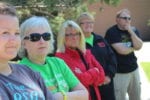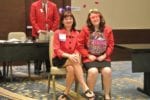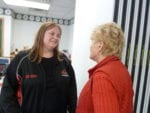As we start the new school year, we value our advisers for their influence on FCCLA members!
Advisers help to develop assets in young people. The FCCLA program is 70 years old this year and countless young people have been guided by their family and consumer sciences teachers. One of our alumni state officers posted this facebook post after a chance meeting with her former FCCLA adviser at the MN State Fair:
“My favorite part of the Fair… running in to one of my favorite teachers & her family! “
Many famous writers, researchers, artists, etc… have stated that we all have at least one teacher who changes our lives. For many FCCLA Officers and members that teacher was their FCCLA or family and consumer sciences teacher.
Here are a few famous quotes to celebrate these inspiring teachers as we start the new school year.
“Good teachers know how to bring out the best in students.” Charles Kuralt.
“When you study great teachers… you will learn much more from their caring and hard work than from their style.” ― William Glasser.
“A teacher affects eternity; he can never tell where his influence stops.” Henry Adams.
The Search Institute has identified 40 assets for youth that adults can have an important part in allowing youth to thrive. FCCLA Advisers will continue to be part of this asset building in a school or community because of the programs and content of Family, Career and Community leaders of America.
Here are some of the assets that FCCLA advisers help to bring to young people.
A successful youth develop program recognizes that adult support is very important to a teen. MN FCCLA has adopted positive youth development philosophies, being grounded in the content area of human development with family and consumer sciences content. We know that research has shown that youth develop positive assets when they feel support and have caring adults around them. (Search Institute research on Development Assets).
http://www.search-institute.org/content/40-developmental-assets-adolescents-ages-12-18#
FCCLA program does a great job of providing youth the opportunity to have access to many of these asset building roles. I see Jacob and the other youth leaders being supported, motivated, challenged and engaged in the FCCLA program. Here are some of the assets that adults contribute to positive youth development.  Some of the categories of assets that FCCLA helps to build in youth are:
Some of the categories of assets that FCCLA helps to build in youth are:
-
Other Adult Relationships Young person receives support from three or more nonparent adults.
-
Youth as Resources Young people are given useful roles in the community.
-
Community Values Youth Young person perceives that adults in the community value youth.
-
Adult Role Models-Parent(s) and other adults model positive, responsible behavior.
Positive Peer Influence– Young person’s best friends model responsible behavior.
High Expectations Both parent(s) and teachers encourage the young person to do well.
-
Youth Programs Young person spends three or more hours per week in sports, clubs, or organizations at school and/or in community organizations.
-
Achievement Motivation Young person is motivated to do well in school.
School Engagement Young person is actively engaged in learning.
-
Caring Young Person places high value on helping other people.
-
Equality and Social Justice-Young person places high value on promoting equality and reducing hunger and poverty.

FCCLA Advisers help to bring out these qualities (Identified in asset building research) in youth leaders.
- Integrity-Young person acts on convictions and stands up for her or his beliefs.
- Honesty–Young person “tells the truth even when it is not easy.”
- Responsibility-Young person accepts and takes personal responsibility.
- Planning and Decision Making Young person knows how to plan ahead and make choices.
- Interpersonal Competence Young person has empathy, sensitivity, and friendship skills.
- Cultural Competence Young person has knowledge of and comfort with people of different cultural/racial/ethnic backgrounds.
- Resistance Skills Young person can resist negative peer pressure and dangerous situations.
- Peaceful Conflict Resolution Young person seeks to resolve conflict nonviolently.
- Personal Power Young person feels he or she has control over “things that happen to me.”
- Self-Esteem Young person reports having a high self-esteem.
- Sense of Purpose Young person reports that “my life has a purpose.”
- Positive View of Personal Future Young person is optimistic about her or his personal future.

What do we ask of the FCCLA advisers? Good youth development would ask the adults involved with our youth leaders to exhibit these qualities when working WITH the youth leaders. Part of participatory style of leadership is to be present to them.
Here are some of the way that (teachers) adults can help.
- Invest—Commit time and energy to doing things for and with youth.
- Show Interest—Make it a priority to understand who they are and what they care about.
- Be Dependable—Be someone youth can count on and trust.
- Stretch—Recognize youth’s thoughts and abilities while also pushing them to strengthen them.
- Limit—Hold youth accountable for appropriate boundaries and rules
- Encourage—Praise youth’s efforts and achievements.
- Guide—Provide practical assistance and feedback to help youth learn.
- Model—Be an example youth can learn from and admire.
- Give Voice—Ask for and listen to youth’s opinions and consider them when youth make decisions.
- Respond—Understand and adjust to youth’s needs, interests, and abilities.
- Collaborate—Work with youth to accomplish goals and solve problems
- Advocate—Stand up for youth when they need it
- Explore—Expose youth to new ideas, experiences, and places.
- Connect—Introduce youth to people who can help them grow.
- Navigate—Help youth work through barriers that could stop youth from achieving their goals.
Have a great school year!


